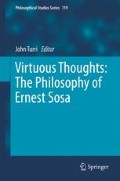Abstract
This chapter considers Ernest Sosa’s contributions to philosophical methodology. In Sect. 1, Sosa’s approach to the role of intuitions in the epistemology of philosophy is considered and related to his broader virtue-theoretic epistemological framework. Of particular focus is the question whether false or unjustified intuitions may justify. Section 2 considers Sosa’s response to skeptical challenges about intuitions, especially those deriving from experimental philosophy. I argue that Sosa’s attempt to attribute apparent disagreement in survey data to difference in meaning fails, but that some of his other, more general, responses to experimentalist skeptics succeed.
Access this chapter
Tax calculation will be finalised at checkout
Purchases are for personal use only
Notes
- 1.
Ludwig (2007).
- 2.
- 3.
Sosa (2007a), p. 54, emphasis in original.
- 4.
Ibid. p. 47.
- 5.
Ibid. p. 49.
- 6.
Ibid. p. 55.
- 7.
Sosa (2007b), p. 51. For subjects to “track” a proposition in the relevant sense is approximately for their beliefs to be counterfactually sensitive to the truth of that proposition; if a subject’s belief tracks the fact that p, then, were p not the case, the subject would not believe that p. See, for example, Nozick (1981), p. 185.
- 8.
Sosa (2007a), pp. 56–57.
- 9.
- 10.
We may interpret (3) as a de re judgment about the amount of hair that Ernest Sosa has; thus do we make plausible that the justification here is intuitive. The judgment that Ernest Sosa is not bald is plausibly a perceptual one.
- 11.
For example, Sosa (2007a), pp. 22–23.
- 12.
Sosa (2007a), p. 60.
- 13.
Sosa (2007a), p. 62.
- 14.
For an overview, see Conee and Feldman (1998).
- 15.
- 16.
Sosa (2007b), p. 54.
- 17.
For a useful overview, see Tversky and Kahneman (1974), especially pp. 1124 (for the connection to generally reliable heuristics) and 1130 (for the prevalence of these rational errors even among experts).
- 18.
Sosa (2007a), pp. 63–64.
- 19.
Sosa (2009), p. 108.
- 20.
Sosa (2010a), p. 419.
- 21.
For example, Stich (2009), p. 233.
- 22.
Sosa (2010a).
- 23.
Sosa (2010a), pp. 421–422.
- 24.
Chalmers (2011) offers an approach to verbal disagreement that classifies James’s case as merely verbal, but points out that it is not plausibly regarded as one in which the participants are fail to disagree about any particular proposition. Chalmers is noncommittal about whether disputes about knowledge like the ones Sosa discusses are candidates for treatment as mere verbal disputes.
- 25.
See, for example, Sosa (2007c), p. 102.
- 26.
Sosa (2007b), pp. 68–69.
- 27.
For example, Swain et al. (2008).
- 28.
Bibliography
Bealer, G. 1992. The Incoherence of empiricism. Aristotelian Society Supplementary Volume 66: 99–138.
Bealer, G. 1998. Intuition and the autonomy of philosophy. In Rethinking intuition: The psychology of intuition and its role in philosophical inquiry, ed. Michael DePaul and William Ramsey, 201–239. Oxford: Rowman & Littlefield.
Burge, T. 1979. Individualism and the mental. Midwest Studies in Philosophy 4: 73–121.
Chalmers, D. 2011. Verbal disputes. Philosophical Review 120(4): 515–566.
Conee, E., and R. Feldman. 1998. The generality problem for reliabilism. Philosophical Studies 89(1): 1–29.
Cummins, R. 1998. Reflection on reflective equilibrium. In Rethinking intuition, ed. Michael R. DePaul and William Ramsey, 113–127. Lanham: Rowman & Littlefield Publishers, Inc.
Ichikawa, J.J. 2011. Experimentalist pressure against traditional methodology. Philosophical Psychology 25(5): 743–765.
Ichikawa, J.J. 2014. Who needs intuitions? Two experimentalist critiques. In Intuitions, eds. T. Booth and D. New York: Oxford University Press.
Ludwig, K. 2007. The epistemology of thought experiments: First person versus third person approaches. Midwest Studies in Philosophy 31: 128–159.
McBeath, K., D. Shaffer, and M. Kaiser. 1995. How baseball outfielders determine where to run to catch fly balls. Science 28(268): 569–573.
Nozick, R. 1981. Philosophical explanations. Cambridge: Harvard University Press.
Sosa, Ernest. 1998. Minimal intuition. In Rethinking intuition, ed. Michael R. DePaul and William Ramsey, 257–270. Lanham: Rowman & Littlefield Publishers, Inc.
Sosa, E. 2007a. A virtue epistemology. New York: Oxford University Press.
Sosa, E. 2007b. Intuitions: Their nature and epistemic efficacy. Grazer Philosophische Studien 74(1): 51–67.
Sosa, E. 2007c. Experimental philosophy and philosophical intuition. Philosophical Studies 132(1): 99–107.
Sosa, E. 2009. A defense of the use of intuitions in philosophy. In Stich and his critics, ed. D. Murphy and M. Bishop. Chichester/Malden: Blackwell.
Sosa, E. 2010a. Intuitions and meaning divergence. Philosophical Psychology 23(4): 419–426.
Sosa, E. 2010b. Value matters in epistemology. Journal of Philosophy 107(4): 167–190.
Stich, S. 1993. The fragmentation of reason. Cambridge: MIT Press.
Stich, S. 2009. Replies to critics. In Stich and his critics, ed. D. Murphy and M. Bishop. Chichester/Malden: Blackwell.
Swain, S., J. Alexander, and J. Weinberg. 2008. The instability of philosophical intuitions: Running hot and cold on truetemp. Philosophy and Phenomenological Research 76(1): 138–155.
Tversky, A., and D. Kahneman. 1974. Judgment under uncertainty: Heuristics and biases. Science 185(4157): 1124–1131.
Weinberg, J. 2007. How to challenge intuitions without risking skepticism. Midwest Studies in Philosophy 31: 318–343.
Weinberg, J., S. Nichols, and S. Stich. 2001. Normativity and epistemic intuitions. Philosophical Topics 29(1–2): 429–460.
Acknowledgments
Thanks to Carrie Ichikawa Jenkins, Ernest Sosa, and John Turri for helpful comments.
Author information
Authors and Affiliations
Corresponding author
Editor information
Editors and Affiliations
Rights and permissions
Copyright information
© 2013 Springer Science+Business Media Dordrecht
About this chapter
Cite this chapter
Ichikawa, J.J. (2013). Virtue, Intuition, and Philosophical Methodology. In: Turri, J. (eds) Virtuous Thoughts: The Philosophy of Ernest Sosa. Philosophical Studies Series, vol 119. Springer, Dordrecht. https://doi.org/10.1007/978-94-007-5934-3_1
Download citation
DOI: https://doi.org/10.1007/978-94-007-5934-3_1
Published:
Publisher Name: Springer, Dordrecht
Print ISBN: 978-94-007-5933-6
Online ISBN: 978-94-007-5934-3
eBook Packages: Humanities, Social Sciences and LawPhilosophy and Religion (R0)

